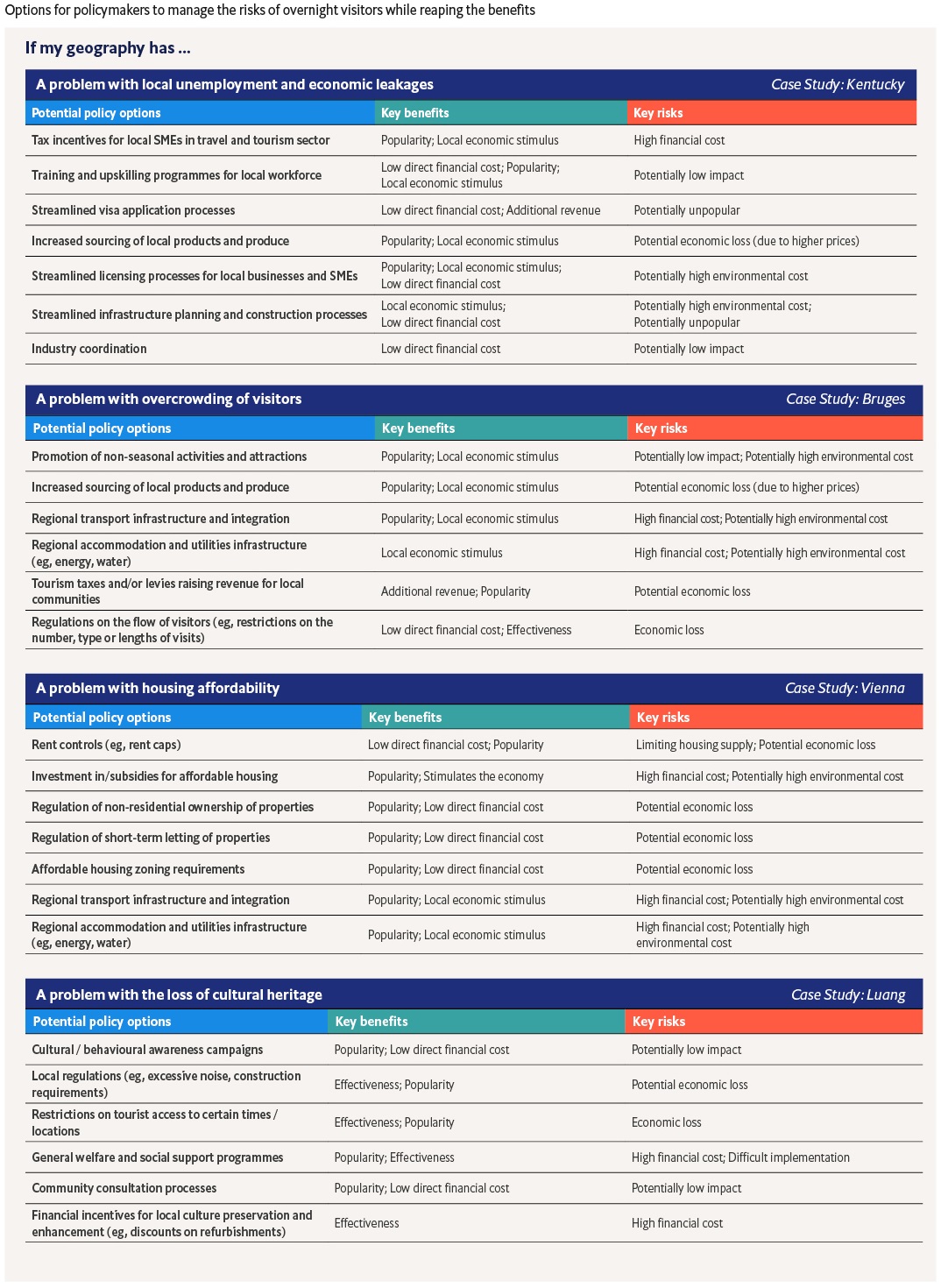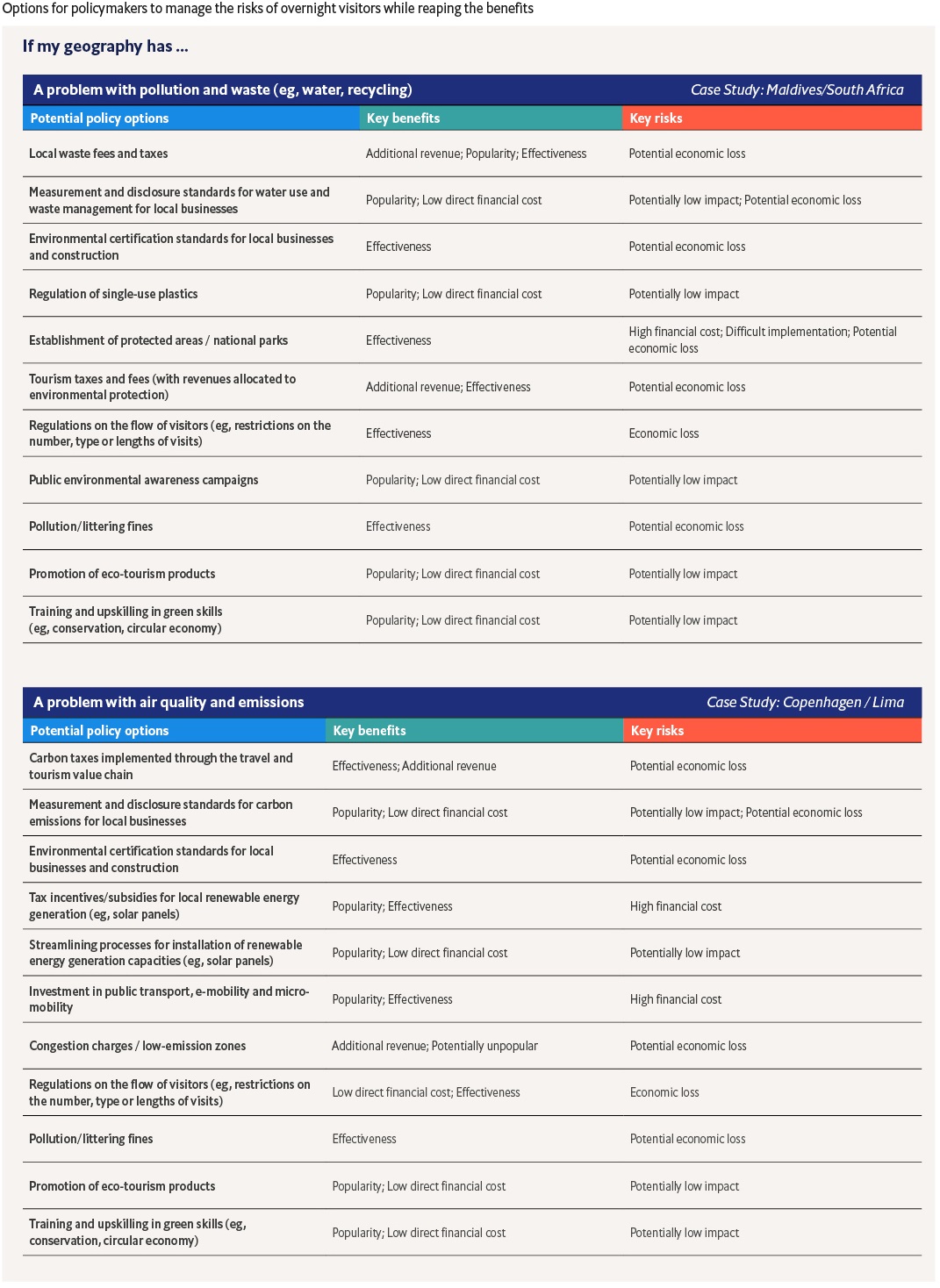Destination always explores and quantifies the economic, environmental and social impacts of overnight visitors in 50 cities and non-urban regions globally. It unpacks how visitor inflows affect environmental and social outcomes and explores the tools with which stakeholders can manage the trade-offs.
Key findings include:
• Berlin, Paris, London, Melbourne and Chicago have been among the most successful in both attracting overnight visitors and managing environmental and socioeconomic pressures. Through a benchmarking exercise focused on the 38 cities included in the study, Economist Impact identified the destinations that have reaped the economic benefits of the visitor economy, while improving environmental and social outcomes. Berlin, Chicago and Lisbon increased their travel and tourism revenue by more than two-thirds in the decade prior to the COVID-19 pandemic, roughly halved their unemployment rates and cut air pollution by more than a third. Paris and Melbourne achieved even more impressive reductions in pollution—50% and 67%, respectively—while increasing travel and tourism revenue by at least 25%. In Latin America, Bogotá and Mexico City have made substantial social strides, especially around addressing gender inequality. The large cities in Southeast Asia—including Bangkok, Jakarta and Kuala Lumpur— have captured significant economic benefits from increased overnight stays, but have room for improvement when it comes to managing environmental and social challenges like air quality or inequality and therefore fall out of the top 10 in our rankings.
The top 10
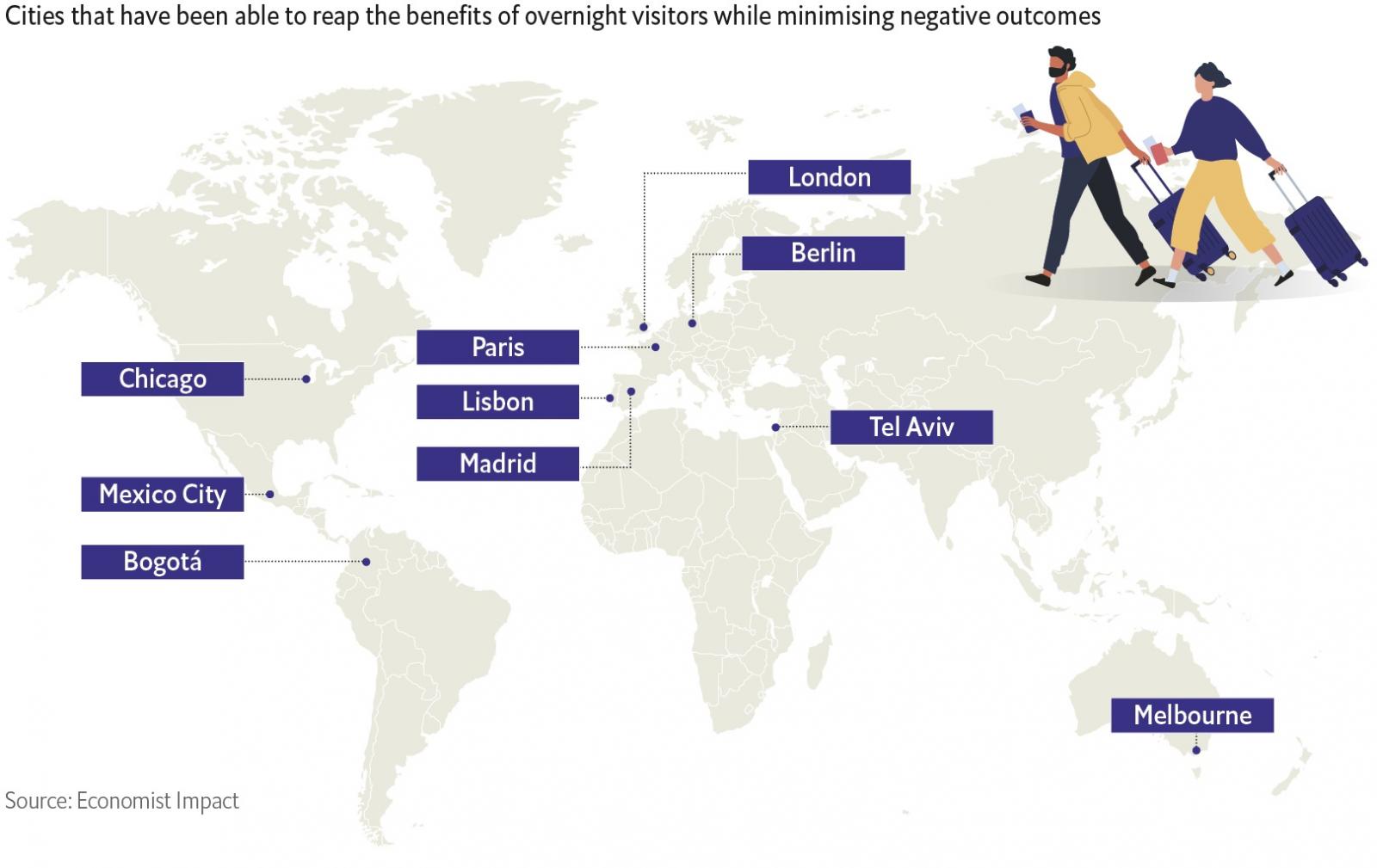
Overnight visitors have enormous potential to catalyse progress in achieving gender equity worldwide. Nearly two-thirds (63%) of respondents in our global population survey felt that travel and tourism had helped to improve gender equity in their local area. These perceptions are supported by our national-level model, which found that a 1% increase in international tourist arrivals was linked to a 0.02% improvement in a geography’s score in the World Economic Forum’s Global Gender Gap report. Additionally, women constitute 54% of the global travel and tourism workforce—compared with 39% of the workforce across the broader economy—and the gender wage gap is smaller in this sector than in other industries, which may contribute to the broader empowerment of women.
• Despite concerns that visitors erode local culture, increased overnight visitors are improving social tolerance. Three-quarters of respondents in our population survey agreed that engagement with visitors had allowed them to better understand different cultures and communities and expanded their worldview, while two-thirds agreed that visitors to their communities have positively impacted locals’ tolerance towards foreigners. This is in contrast to the perception of almost half (48%) of respondents that travel and tourism has contributed to the loss of local culture, compared with 31% who disagreed.
Rising tolerance
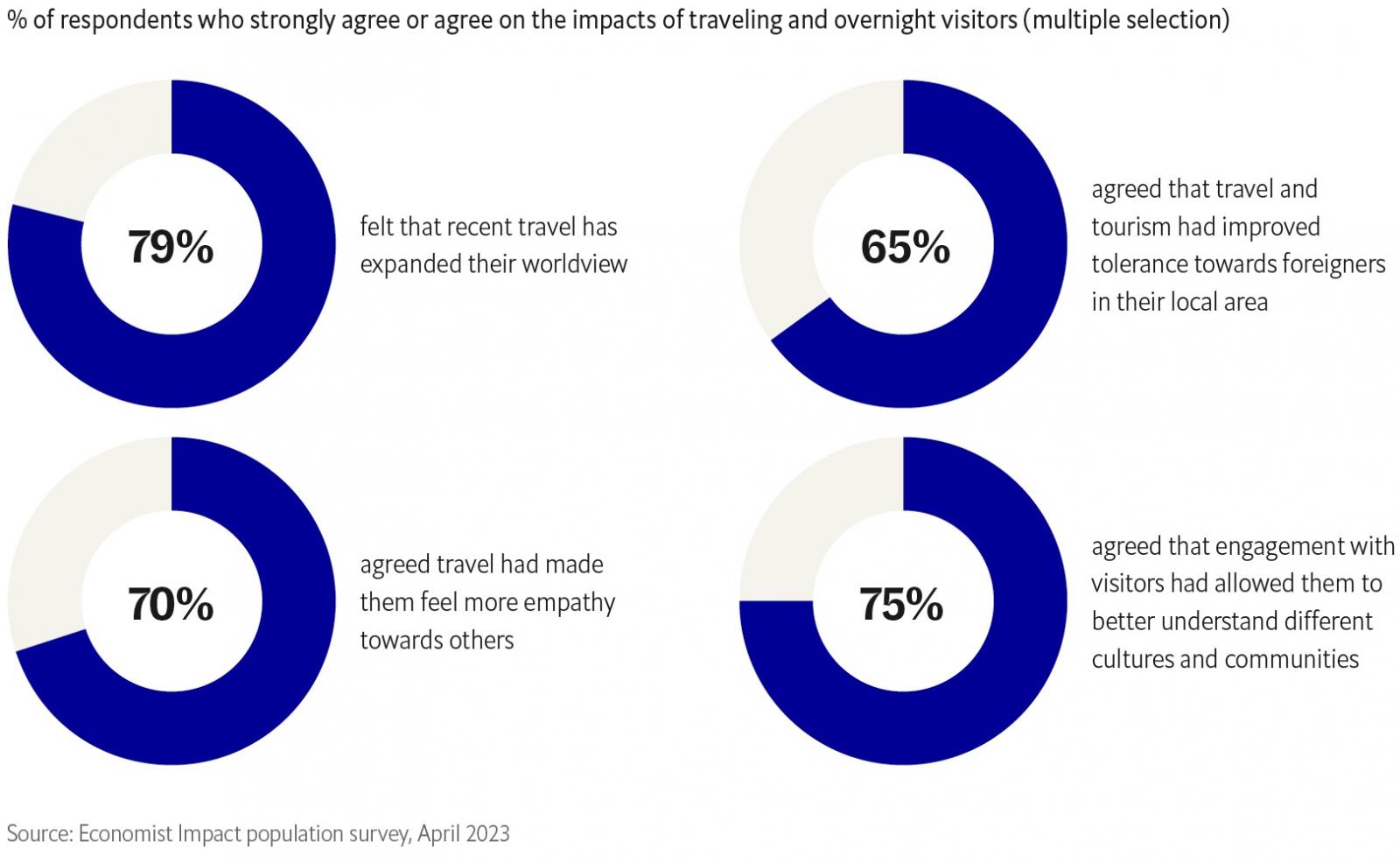
• Visitors positively contribute to economic growth in recipient destinations, but the magnitude of impact depends on the destination’s ability to minimise economic leakages and attract high-value-added visitors. Visitors stimulate demand for goods and services and incentivise the development of local infrastructure, contributing to local economic activity. In three surveys conducted as part of this study, policymakers (91%), business executives (81%) and the general population (79%) all agreed that visitors drive economic growth. These perceptions are supported by our impact assessment model, which finds that increases in overnight stays have a positive impact on real GDP across all regions. These impacts vary across regions: the largest are felt in North America, where a 1% increase in visits is associated with a roughly 0.5% increase in real GDP, while the uptick in Asia-Pacific and Europe is 0.24% and 0.22%, respectively. These regional differences highlight two key factors influencing the economic impacts of incoming visitors: the composition of visitors and the extent to which the goods and services consumed by visitors are produced and provided by local businesses (ie, the extent of economic leakages).
• Destinations that prepare for and encourage increased overnight stays could see significant boosts for their economic growth and employment. Based on our modelling, if the seven destinations in the US and Canada considered in this study experienced a 5% increase in overnight visitors compared with the baseline forecast of visitor flows, they could add up to 2.5% of real GDP— an additional US$110bn—by 2030. In Bangkok, an additional 5% increase in overnight stays could result in an almost US$1.8bn increase in GDP by 2030, and a similar percentage increase in overnight stays could reduce unemployment rates by an additional 1.7% in Mexico City over the same time period. In Johannesburg, a 5% uptick could add 44,200 jobs to the local economy.
• Despite perceptions that overnight stays substantially increase the cost of living, our research finds that this is not generally the case. Only in tourism-intensive destinations do we find a correlation between visitors and rental prices. Four-in-five policymakers, two-thirds of business executives and two-thirds of the general population believe that inflows of visitors have raised the cost of living (especially housing affordability) in their community. Our model, however, found a direct link between visitors and average rental prices only in destinations where a higher share of local GDP comes from travel and tourism. In these destinations, a 1% increase in overnight stays has been associated with a 0.03% increase in rental prices. Our model also shows that economic and policy factors, such as real GDP growth, local lending rates and unemployment rates are the predominant factors driving rental prices. Ultimately, there are differing opinions across stakeholders, regions and individual cities about how to develop effective housing policies to offset the challenges in impacted geographies.
It's not just the economy
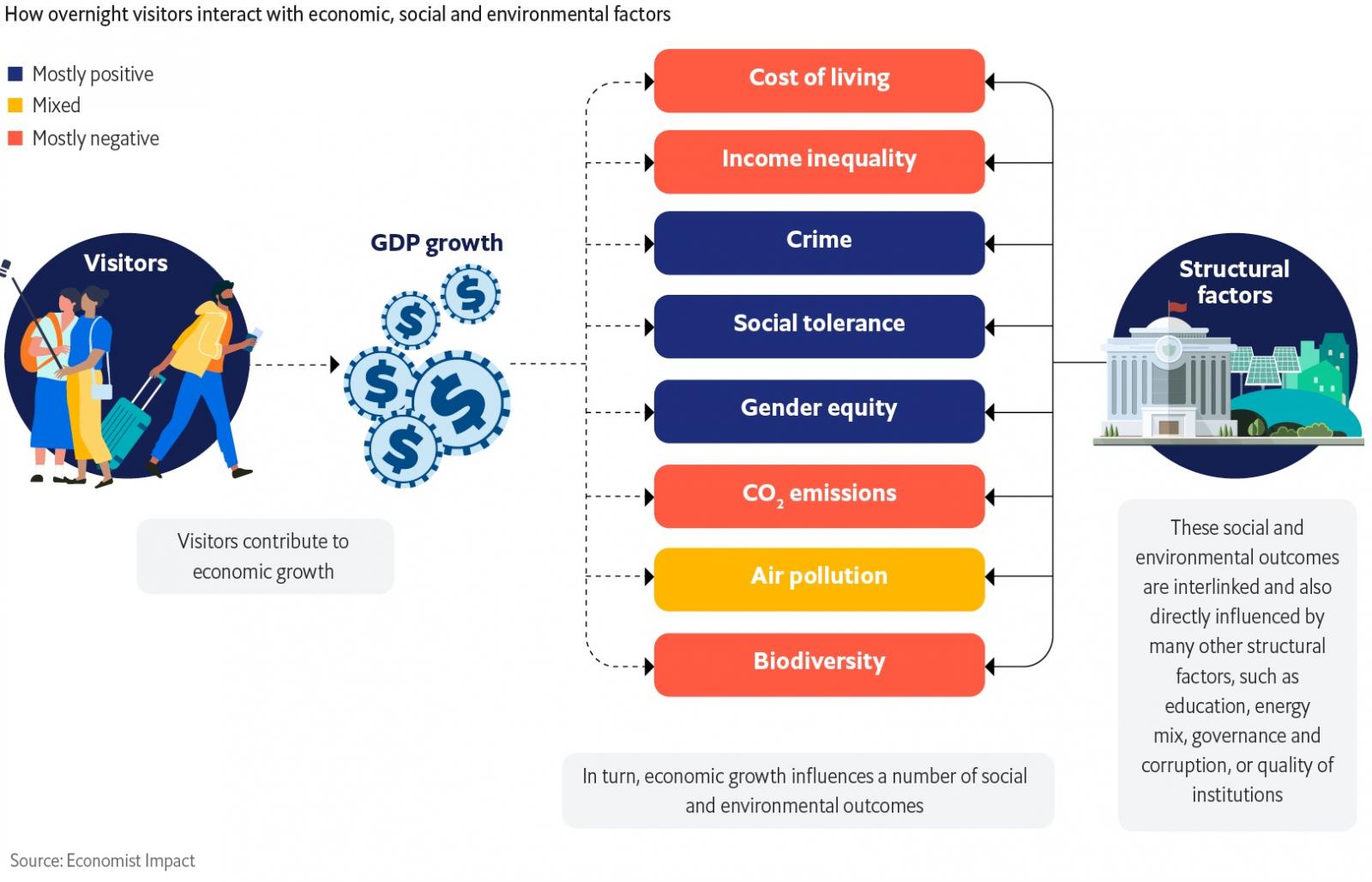
• Overnight visitors create a significant carbon footprint when travelling to and from a destination. If the infrastructure to accommodate overnight visitors exists, however, overnight visitors’ carbon footprint during their stay is influenced by the underlying carbon intensity of the destination. The majority of carbon emissions associated with travel and tourism are related to transport to and from the destination. Our model found that a 1% increase in international overnight visitors is associated with a 0.23% increase in emissions from air traffic. However, when controlling for the economic, energy and demographic characteristics of the destinations, we found that visitors have a relatively limited additional impact on local carbon emissions, beyond what is reflected in their contribution to local economic activity. Although the energy mix and carbon intensity of the destination influence the level of emissions the visitors produce, visitors can still contribute to climate action.
• Getting the right policy mix, which fits local contexts and challenges, is key to harnessing the economic impacts of overnight stays. Local businesses and employees need to be able to adequately provide the goods and services visitors need. To encourage local production and employment, policymakers and business leaders in our surveys and workshops indicated that training and upskilling programmes for the local workforce, and increasing sourcing of local products can be effective. These, however, should not come at the expense of efficient sourcing. Economist Impact has developed a challenge-policy intervention matrix that can help decision-makers understand the policy options available and the trade-offs of these options in their local context.
Challenge-policy intervention matrix
